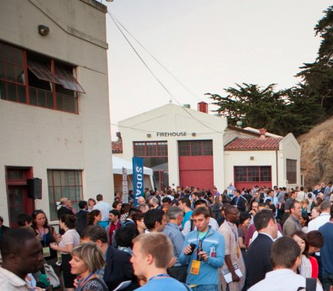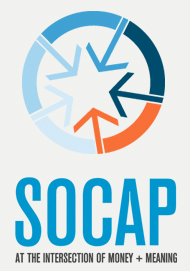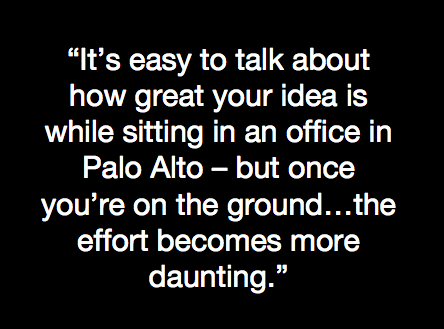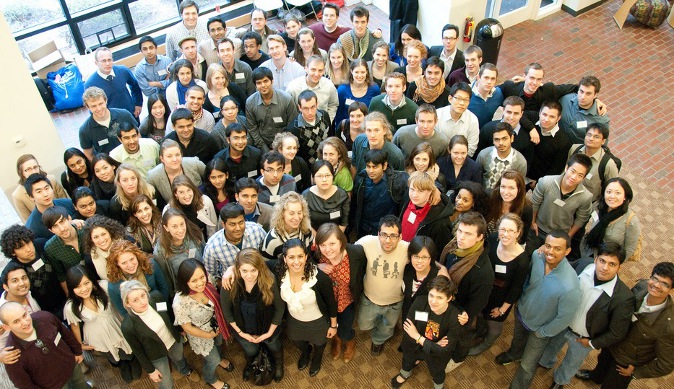Somebody told me this morning that, though she’s fully engaged and willing to help raise more funds around the project we are working on together, she knew that I was trying to build something beyond just this project, that this project was just a part of something bigger. But she wasn’t sure of just what the whole picture looked like.
“If you get everything you want funded, what would that look like?” she asked. “If we get funding for everything I want to get funded, and people sign up,” I told her, “my five- and eight-year-old grandsons will live in a more connected but locally resilient world with better tools to adapt.”
 As one aspect of that meta endeavor, teams are coming together to build various parts of the projects that will show up at SOCAP13, with the conference being kind of a milestone to show their progress and help motivate them to reach goals.
As one aspect of that meta endeavor, teams are coming together to build various parts of the projects that will show up at SOCAP13, with the conference being kind of a milestone to show their progress and help motivate them to reach goals.
Joseph Steig, yesterday, signed up to lead the mobile, digital, and device portion of the content in the health track at SOCAP13. He’s the driving force that could result (pending board approval) in Village Capital launching a health-focused cohort of its seed-funding program. It would launch the first week of September in San Francisco during SOCAP13.
Also on board in that emerging collaborative are the women from RIVET – Amy Lockwood and Leslie Ziegler – who are focused on creating the first digital health accelerator that’s focused on the developing world.
They will have Indian-based entrepreneurs and American-based entrepreneurs focused on mobile, digital, and devices to serve the market of the poor in India, with the idea that some Jugaadinnovation – some innovation created in the unique environments of India – will come to the west once they get it going. Ziegler was the Creative Director and Chief Evangelist at Rock Health, a San Francisco-based incubator for early-stage domestic digital health start-ups. So, though her new accelerator is internationally focused, we’re going to rely on her expertise and connections to guide us to the best Bay Area and Silicon Valley-based startups.
Our domain expert in health is Dr. Doug Jutte, a neonatologist and public health and population expert who leads a new research facility funded by the Robert Wood Johnson Foundation.
Jutte brings in the lens of housing and health now seen through a holistic lens by affordable housing and public health practitioners as a tool that is starting to transform the system, lowering costs while it improves health for individuals, families and communities. Up until a couple of years ago, people working on affordable housing did not talk or share notes with people working on health care, even though they often focused on the same people living in the same apartments. A holistic approach is proving to be the way to create healthy communities at lower cost.
One of our key design principles is that we at SOCAP create the intersections where you meet valuable strangers. To get the most out of that, you have to know how to partner quickly, flexibly, and understand the rapid math of give and get as those partnerships emerge.
Amy Lockwood, of RIVET, does that well. RIVET is in partnership talks with Dasra, the India-based accelerator, and will be part of the Sankalp event, and plans to be involved at other venues as well. It’s easier to partner with people who have a clear partnership strategy and know how to make projects come together, and Amy Lockwood seems to be particularly good at those aspects. I’m glad to be part of helping her and her team reach their goals, using our convening platform as a way to coalesce resources toward a timeline where things show up at SOCAP13, then using the conference and the people gathered to add momentum.
For the Village Capital / RIVET working sessions at SOCAP, which will be open to the public, we are going to use the Good Pitch format that my business partner, Tim Freundlich, has used well before. The format allows alphas for a project to get to show their generativity instead of their teeth, by either a) offering an idea, b) offering a referral or c) offering a follow-up meeting. Compared with other similar set-ups, the Good Pitch format is more a porpoise pool than a shark tank.
If you want to learn how to be an effective investor or mentor to a fast-moving startup in a hot sector where there is deep mission insurance; where the technologies are targeting diseases that mostly afflict poor people, for example, these Good Pitch sessions with VilCap and RIVET – assuming we pull them off – should be ideal.
If we don’t achieve that jointly timed launch, we can talk about the process of moving together toward that goal and where we each are heading, and how we are collaborating; the organizational and scheduling and curriculum overlap ties might need to be looser than we imagine at first; we don’t know yet.
In the meantime, VilCap has signed up to help RIVET figure out a lot of the elements of their launch, answering questions and providing guidance. They’ve been doing that for other accelerators for a while now, some not at all focused in the innovation space.
We’re also glad to see our own HUB Ventures “spin out” from the HUB and SOCAP “incubator” and go out on its own. Wes Selke and Rick Moss have done a great job with it: some graduating companies have been invested in by top-tier firms like Andreessen Horowitz, some have raised multiple millions in follow-on rounds, and one has sold for $15 million, looking just at the financial side of their success. And many of the surviving companies are doing really good and increasingly big and important things in the world, in the United States, and some locally in San Francisco on the impact side. We look forward to continuing to work with them and continuing to make the HUB platform a core of what HUB Ventures offers.
A SOCAP conference is a circus led by volunteer teams like the ones I’ve written about here. The goal is that they show up as real, and moving toward solid achievements by September, but they are usually just in active formation at this time of the year. It’s like a collectively-built barn-raising version of Cirque du Soleil to save the world. It’s kind of a wild ride.
We have discovered that our platform helps people be a little more daring, a little braver, together, than they would otherwise be, to tell a little bit bigger story, about where they want to go, and that somehow, doing that helps them get a little farther than if our platform didn’t exist. We enable a kind of emergent innovation and daring for people who want to redesign our economic system on the fly. People are bringing their A-game this year. It should be fun.
We are also finalizing plans to have Ben Metz run the panel picker tool and process, so that 20% or so of the content at the conference is crowdsourced, with the community coming up with the content and voting it in. We don’t have all the answers. So, we are building in collective intelligence tool methodology at every point in the process that we can, thus creating a wider diversity of input as we start to build a networked system.
The overall conceit, the dream of the conference is that we are building an operating system to accelerate the good economy, using a phrase that our producer and my wife, Rosa Lee Harden, borrowed with permission from Colin Mutchler of Louder. We borrow from everybody.
Mark Beam, a SOCAP co-founder now with Halloran Philanthropies, provided a lot of the ethos behind our collaborative approach. We just want to assemble the smartest tables; we don’t have to be the smartest people at the table. SOCAP is a collective intelligence product.



